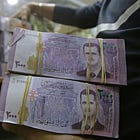Breadcrumbing Syria: EU Suspends Restrictions Amid Rising Tensions
The punitive nature of the suspensions reflects a continued European effort to leverage Syria’s economy, aligning with Israel and the UAE against HTS.
More than two months after the fall of the Assad regime, the European Union has suspended some restrictions on certain sectors in Syria. The bloc has been reluctant to lift sanctions on the newly liberated country, citing the Islamist background of Hayat Tahrir al-Sham (HTS). Behind this hesitation lies a desire to undermine non-Western-aligned plans that threaten their IMEC-based agendas. The punitive nature of these suspensions points to a continued European effort to leverage Syria’s economic potential, revealing a sanctions regime that is no longer aimed at the dictatorship, but rather at the Syrian people. These conditional offerings align the EU with Israel and the UAE against political Islam, setting the stage for an Israeli victory in an imminent Israel-Syria clash.
Europe’s Post-Assad Sanctions Regime
The newly announced suspensions will cover energy, transport, and banking, and are set to take effect next Monday. The energy-related cover oil, gas, and electricity, and open the way for the Syrian purchase of Turkish, Qatari, Saudi, and even Greek energy.
As for the banking sector, international transactions related to energy and transport for reconstruction purposes will no longer be restricted. This also paves the way for Gulf reconstruction efforts. Moreover, the funds of four banks will be unfrozen: Agricultural Cooperative Bank, Industrial Bank, Popular Credit Bank, and Saving Bank. None of these institutions are among the country’s top five largest banks. New exemptions are to be introduced to facilitate financial relations between member states and Syria. If realised, this development could mirror the Syrian version of the Instrument in Support of Trade Exchanges (INSTEX), an EU initiative designed to bypass US sanctions and facilitate trade with Iran. Syrian Arab Airlines will have its assets unfrozen, which is likely to encourage the airline to purchase European-made planes, creating a mutually beneficial deal. Likewise, some unspecified restrictions on the Syrian Central Bank will be eased.
The targeted institutions and sectors for these suspensions allude to disingenuousness in the EU gesture, as they are not key institutions; giving them room to breathe will not significantly support the economy. As such, EU sanctions remain in place on key foundational sectors: major banks, including the Central Bank, industrial sectors and weapons imports. The Syrian military is prohibited from purchasing weapons for defence, a restriction that may prove detrimental amid Israeli advances in southern Syria.
The EU Foreign Policy Chief was careful to emphasise the temporary nature of the suspensions, stating that they would be reversed should any action by Hayat Tahrir al-Sham provoke anger in Brussels. That said, even if the EU were to lift sanctions, the economic impact would not be significant for Damascus. The US remains the ultimate decision-maker regarding Syria’s economic future. Unless US sanctions are lifted as well, the EU measures will have very limited impact. The US is likely to follow the EU and demand some geostrategic concessions in exchange for sanctions lifting.
An Empty Gesture, A Weighty Alignment
While Brussels reconsidered its sanctions regime, Israel has capitalised on the chaos following Bashar Assad’s ousting to lay the groundwork for war. After advancing and establishing a base in the occupied Golan Heights, Israel mobilised minorities; one particular strategy involves integrating southern Syrians into its economy. This approach will ensure that southern Syria does not "become southern Lebanon," as warned by the Israeli Defence Minister, in relation to the bombardment near Daraa and Quneitra. Moreover, Israel is collaborating with Abu Dhabi to advance a global campaign against political Islam and delegitimise HTS, a plan that aligns the state with the EU.
In the lead-up to this potential war, targeted killings of HTS leaders are expected. The ensuing chaos will likely be exploited to push for minority separation. Israel is then expected to offer protection, in a manner similar to Russia’s approach with the breakaway republics in Ukraine.
Regardless, war is imminent and risks putting all HTS efforts for economic recovery to rest. US Special Envoy to the Middle East Steve Witkoff recently stated that Syria, and Lebanon, could potentially join the Abraham Accords. The statement alludes to a future reconstruction-for-normalisation deal between Israel and Syria.




